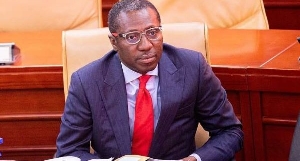The Queen Mother of the Peki Traditional Area and President of the Volta Regional Queen mothers Association Mamagah Kofi Brah has said there is the need for Ghanaians to expedite action on the laws on property distribution at divorce.
He said under the current laws several problems arise in sharing marital property at divorce.
Mamagah Kofi Brah was speaking at a GTZ workshop on legal pluralism and gender issues in Accra.
In Ghana's plural legal system, apart from the customary law rules and Moslem rules on the distribution of property between spouses at divorce, the primary statutory law is found in the Matrimonial Clauses Act 1971 (Act 367).
Section 20 of this act has some provisions on property distribution but these according to legal experts are inadequate.
It has also been interpreted in such a manner that it has over the years denied women the right to a share of marital property at divorce.
However Article 22 of the 1992 constitution calls on Parliament to enact legislation to ensure the equitable distribution of marital property at divorce between spouses.
The draft bill on "Marital Property Distribution at Divorce" is yet to go before Parliament.
The bill is aimed among others to ensure that spouses get a fair share of property acquired upon divorce.
Dissolution
Article 22(a) of the 1992 Constitution states "Spouses shall have equal access to property jointly acquired during marriage," while Article 22(b) says, "assets which are jointly acquired during marriage, shall be redistributed equitably between spouses upon dissolution of the marriage."
"In ideal circumstances, when people get married, they are expected to be united until death and therefore most people do not consider the possibility that there is a likelihood of a break-up of the marriage and problems associated with it," she said.
She said the definition of marital property at divorce becomes a big problem. It is usually not known whether the marital property should include gifts to the couple, individual properties acquired in the course of the marriage or properties jointly acquired by the couple.
In many instances those who usually find themselves at the losing end in the distribution of property are women. "This is because even though they contribute a lot to the acquisition of property, they usually do not ensure that their names are on title deeds to properties like houses and land," she said.
Mamagah Kofi Brah further explained that under customary law women are expected to assist their husbands in whatever vocations they are engaged in but this did not give them the right to any property acquired out of profits from the business.
"Consequently at divorce, she is only entitled to her meagre private assets," she said adding sometimes even if she is deemed responsible for the breakup of the marriage, she would be asked to return all gifts from her husband."
Mamagah explained that the situation has to change since in recent times many women are well-established professionals or are engaged in income generating activities..
"There is therefore the need for legislation to ensure that they are entitled to a reasonable option of such properties in the event of dissolution of their marriages," she said.
Legal advocates have already proposed that upon divorce in order to ensure accurate distribution of a wife's property interest, the new legislation should explicitly guarantee a wife's receipt of independent ownership of at least one-half of the marital property in Ghana.
Giving recommendations for the proposed legislative reform which is being discussed among legal circles, another member of Leadership and Advocacy for Women in Africa (LAWA) Sheila Minka-Premo said LAWA proposes that the new legislation should explicitly guarantee a wife's receipt of independent ownership of at least one-half of the marital property in Ghana upon divorce, in order to ensure accurate distribution of a wife's property interest.
Resources
"Separate property should be distributed equitably but after five years of marriage the statute should ensure that a wife receives no less than one-third of her husband's property."
Adjetey also said some factors such as existing income, earning capacity, property and other financial resources of each of the parties to the marriage should guide the court in its ruling on such matters.
Again she said, the court in its ruling on a divorce case should take into account contributions each party has made to the welfare of the family, including any unremunerated contribution of house work, childcare, and work on the family land and in the family business in apportioning property.
In addition, the age of a spouse, duration marriage and the conduct of each party in the course of the marriage, the conduct of each of the parties during the period of the marriage should be included.
Minka-Premo also noted that in the case where either spouse does not own the property of a marriage but is rather leased to him, a wife's right to use a minimum percentage of the property should be guaranteed.
"This guarantee should run for the lifetime of the lease or the lifetime of the wife ending either at the time of the lease or the life of the wife," Minka-Premo added.
Nana Akufo-Addo, Minister of Justice and Attorney-General last year observed that existing laws on marriage have failed Ghanaian women, hence the need for a review.
"The 1985 Customary Marriage and Divorce Registration Act which seeks to criminalise the failure to register marriages registered under it is more honoured at its breach," he said adding, "the law is completely silent on the issue of property settlement."
He has therefore suggested a holistic approach review to ensure uniformity in the application of family laws in the country.












